- Home
- Wendell Berry
The Selected Poems of Wendell Berry
The Selected Poems of Wendell Berry Read online
WENDELL BERRY
PORT WILLIAM NOVELS & STORIES:
THE CIVIL WAR TO WORLD WAR II
Jack Shoemaker, editor
THE LIBRARY OF AMERICA
Volume compilation, notes, and chronology copyright © 2018 by
Literary Classics of the United States, Inc., New York, N.Y.
All rights reserved.
No part of this book may be reproduced in any manner whatsoever without the permission of the publisher, except in the case of brief quotations embodied in critical articles and reviews.
Published in the United States by Library of America.
THE LIBRARY OF AMERICA, a nonprofit publisher, is dedicated to publishing, and keeping in print, authoritative editions of America’s best and most significant writing. Each year the Library adds new volumes to its collection of essential works by America’s foremost novelists, poets, essayists, journalists, and statesmen.
Visit our website at www.loa.org to find out more about The Library of America, including our signature black-jacketed series, Paperback Classics, and American Poets Project; and to sign up to receive our occasional newsletter with exclusive interviews with Library of America authors and editors, and our popular Story of the Week e-mails.
All texts published by arrangement with Counterpoint Press.
The Library of America wishes to thank Mary Berry for her assistance in the publication of this volume of her father’s work, and Michele Guthrie of The Berry Center for her efforts in helping prepare the Chronology.
Endpaper map and family tree designed by Molly O’Halloran. Genealogy prepared by David S. McCowen.
Library of Congress Control Number: 2017939510
e-ISBN 978–1–59853–570–9
First Printing
The Library of America—302
Wendell Berry: Port William Novels & Stories:
The Civil War to World War II
is kept in print in memory of
OWSLEY BROWN II
(1942–2011)
in recognition of his support of The Berry
Center in New Castle, Kentucky, advocating for
farmers, land-conserving communities, and
healthy regional economies
with a gift from
HIS LOVING FAMILY
to the Guardians of American Letters Fund,
established by the Library of America
to ensure that every volume in the series
will be permanently available.
Wendell Berry: Port William Novels & Stories:
The Civil War to World War II
is published with support from
THE GOULD FAMILY FOUNDATION
ELEANOR BINGHAM MILLER
STEVEN NIGHTINGALE
AN ANONYMOUS FRIEND
Contents
The Girl in the Window (1864)
The Hurt Man (1888)
Fly Away, Breath (1907)
A Consent (1908)
Pray Without Ceasing (1912)
Watch With Me (1916)
A Half-Pint of Old Darling (1920)
The Lost Bet (1929)
Nathan Coulter (1929–1941)
Down in the Valley Where the Green Grass Grows (1930)
Thicker than Liquor (1930)
Nearly to the Fair (1932)
Burley Coulter’s Fortunate Fall (1934)
The Solemn Boy (1934)
A Jonquil for Mary Penn (1940)
Turn Back the Bed (1941)
A Burden (1882, 1907, 1941)
A Desirable Woman (1938–1941)
Misery (1943)
Andy Catlett: Early Education (1943)
Andy Catlett: Early Travels (1943)
Drouth (1944)
Stand By Me (1921–1944)
A World Lost (1944)
A Place on Earth (1945)
Making It Home (1945)
Not a Tear (1945)
Chronology
Note on the Texts
Notes
PORT WILLIAM
The Girl in the Window (1864)
THEY MIGHT as well all have been the same bunch, although they weren’t. Sometimes there would be enough gray uniforms or uniform pieces among them to permit them to be identified (perhaps) as Rebels. Sometimes they would be more formally recognizable as Yankees because they would all be dressed in uniforms that would be blue. Sometimes, because of their unlikeness to one another and to any living thing ever before seen in Port William, you couldn’t tell who they were. Whoever they were, the town shut itself against them like a terrapin closing its shell. From the yards and porches and storefronts along the single street, people withdrew behind doors. People who had ridden into town in a wagon or on horseback got themselves and their animals out of sight, if they could. Otherwise, they were apt to have to get away on foot, their mules or horses “requisitioned,” and if the younger men could get away at all before being arrested or “recruited.”
The Yankees would be looking for persons disloyal to the Union, a category not clearly defined, or for revenge against perpetrators of disloyal acts, which also were not well-defined or perhaps even definable. The Rebels would be on the lookout for recruits. The others, the self-described irregulars or guerillas, would be actuated, as like as not, by some local grudge going back a long time before the war. All of them, always, were looking for any livestock that could be ridden, worked, or eaten, anything that could be eaten, anything usable as a weapon, anything portable that was worth carrying away, any opportunity for amusing themselves by any of the cruelties available to those who had abjured, seemingly forever, the laws of kinship and friendship and neighborhood.
And Port William was isolated, beyond the reach of official help, too small and divided even to consider defending itself, both too Southern and too near the Ohio River.
Doing freely, beyond constraint or compunction, the things that it seemed men would do if they got the chance, they all were trouble, trouble when they were present, trouble when they were gone, no end of trouble. She feared them all, and therefore she hated them all.
She was Rebecca Dawe, daughter of Maxie and James John Dawe, sister of Galen Dawe who had been killed by a neighbor as he was leaving to join the Confederate army at the start of the war. Her two older sisters were at home on the river bottom farm down by Dawe’s Landing where their father had a store, and where the family and their handful of slaves provided more help in fact than was needed. She could be spared. And so she had come up to Port William to help her aunt Dicey, her mother’s sister, with her young children, to help with the work of the household, for her greater safety as her parents saw it, and as she herself saw it for relief from isolation in the great space of the river valley and from her parents’ grieving.
And Dicey needed her. Until Rebecca came, walking barefoot up from the river, carrying her shoes and extra clothing bundled in a shawl, Dicey had been alone with her three children, the oldest almost still a baby, and what she called her little dab of livestock: a milk cow, two shoats, and by now a bare dozen hens. Like some of the other houses in Port William, the Needlys’ fronted a small farm, theirs going narrowly all the way back to the woods on the river bluff. Dicey’s husband, Thomas Needly, the town’s only blacksmith, was in the federal military prison in Louisville for an “act of disloyalty.” One evening past dark, working mainly by feel, he had reset a shoe on a stranger’s horse. He had charged nothing. The stranger, who was in a hurry, had not asked what he owed, and Thomas, in the circumstances and from experience, was afraid to name the price. But the stranger had been the wrong one to help out with such a favor. He was a wanted man. He was caught, and on his testimony Thomas Needly was charged with aiding
him in his attempt to escape.
A small band of federal soldiers came in the night, arrested Thomas, and carried him away. Dicey did not know why they had taken him or where, or if he was alive, until she received a long-delayed letter somehow smuggled out of the prison. It was a letter much beyond Thomas’s powers of writing, written for him in a determinedly beautiful flowing script by a fellow prisoner:
Mrs. Needley
dr. Madam:
Thos. Needley your houseband was put in here the fed. mil. jail at Louisvle on yesterday charged with aiding a Rebble. He says say he is well & alrite & fully abled of body & mind & send cloths, &c if poss.
a Friend
Dicey did send a packet of his clothes and a few other things that, not knowing, she thought might be of use. This he never received, nor did she hear from him again. Until the war ended nearly a year later, for all she knew, he had fallen off the edge of the world.
And it had been, she would think, a kind of world’s edge that he had been to, for he had come back from the helplessness and powerlessness of the dead. When he stood again at his anvil in his strength, in the fierce heat and exactitude of his old work, he had, it seemed to her, the aspect of one who had returned from the grave.
In Thomas’s absence, lacking his offering to the community of his needed work and its return of money, the household had become oversimplified and poor. Dicey, who had married late, was thirty, Rebecca just sixteen. They watched over the children. They kept house sparely and neatly. They gardened and foraged and traded for food, and accepted gratefully the food sent up to them from the Dawe household down in the river valley, always in small amounts as a precaution against theft and because, even at the Dawes’ place, food was hardly abundant.
The dab of livestock pertained to the two women and their household only conditionally. The two shoats, their ears notched, had been turned loose in the woods, and they were Dicey’s own still if they were not caught or shot by some band of soldiers or bushwhackers, and if ever she could get them penned and slaughtered when the time came. The chickens, too easily stolen from the henhouse, had been allowed to go half wild, roosting in trees and hiding their nests in the weeds or the barn, at the mercy of predators. The cow they had saved from theft or slaughter, so far, by confining her in the farthest pasture. Thomas had built in a corner next to the woods a pen of split rails and a small shed where some hay could be stored. To this pen Rebecca carried the milk bucket every morning and every evening, the children following along. And then she carried home again enough milk to drink fresh and to keep them in cream and butter and clabber. “The cow,” said Dicey, who liked to say things well, “is our luck and our luxury.”
This was late in the summer of 1864, and their luxuries were in fact lucky, and rare. But they were living in what Rebecca was learning fast to recognize as the human condition, in which things are most clearly known by their opposites. She and the others were most touchingly and dearly living because Galen Dawe and so many others were dead, because so many boys even as young as Rebecca had been killed in battle, cut down like weeds. They were most movingly, most consciously and thoughtfully free, because Thomas and so many others were in prison. They ate with relish their frugal meals because of the lively possibility that even they, before the coming winter would be over, could be hungry. They were gathering in and preserving and putting away, even hiding, every surplus scrap of food. There would be stuff yet from the garden. In the fall they would gather walnuts and hickory nuts from the woods. They might, with help, catch and slaughter the two hogs. But the prospect was neither bounteous nor certain.
There were times when their thoughts were carried round and round by hope and fear, courage and resignation. Dicey said, “Lord, I reckon the pore human race has come to a many a fall such as this one. We’ll make it, maybe, if those creatures don’t steal the food right out of our mouths.”
At the start of the war she had been openly in sympathy with the Confederacy, like the rest of her family. By now all the violent ones in their bunches she called, without distinction, “creatures.” It was a vital, reverberant word when she said it, for as she acknowledged with frank reluctance the belonging of all creatures to God she pointedly refused to these the classification of “human.” Even at the height of her resentment and indignation she did not curse them. But she made no distinction between them and the other creatures—“supposedly,” as she would say, “lower”—who conducted themselves in bunches. The state was occupied officially by the Union army. She did not indulge herself by supposing that official occupation by the Confederate army would have been better or, for that matter, different. Power—and for how long?—was the power of the bunch.
The bunches had been with them from the beginning. In the summer of 1861 a company of recruits of each side had drilled in Port William on the same day, and by their taunting back and forth had come close to a shooting scrape right there in the road. “It was almost history,” Dicey said. “It would have been known as the Battle of Port William.” If it had happened, it would have been as intimate an engagement almost as a family quarrel. No strangers would have been involved. Everybody in each company knew everybody in the other one. It would have been Port William’s own. The town and the countryside were divided most cruelly, for the division was not among strangers but among neighbors and kinfolk. That was why in the Port William neighborhood the violence peripheral to the official war was never entirely at rest. In addition to the almost routine recruiting or kidnapping, arresting and stealing, there were barn-burnings and other acts of vandalism. Threats were shouted from the darkness, or delivered openly to housewives standing in their doorways. And there were rumors, groundless as often as not, but grounded firmly nonetheless on experience.
The effort of the day was all but over, though the sun was still well up in the sky. Rebecca and the children had walked back to attend to the cow and walked home again with the milk, giving Dicey time to set the house to rights and have a little quiet. Rebecca then had come upstairs to her bedroom, for she loved the stillness of the ordered house at the day’s end, and she too needed her quiet. The house, especially the upstairs rooms, was warm beyond comfort, but she sat still by the open front window for the touch of a breeze that was there, and looked out as she liked to do. In a while they would have a supper of milk and cold biscuits and other leftovers from dinner, and then she and Dicey would sit on the front porch in the gathering dusk while the children played in the yard. By full dark all of them would be in bed—“to save light,” Dicey would say, meaning candles and lamp oil.
The shadows of the house and the trees beside it had reached all the way across the road to the Feltner house shut and quiet on the other side. And then the murmur of voices from down along the few storefronts of the town became briefly louder and then ceased altogether. She heard the hoofbeats of one horse galloping away along one of the paths that led out from the town into the fields. A shiver passed over her as shivers do when somebody has stepped on the place that will be your grave. She leaned in her chair to look, and saw coming down the hill from the schoolhouse, toward the stores and the bank and the church in the town’s middle, a little band of riders. They rode at a walk, looking around. When they came among the business places, now evidently shut and deserted, they stopped, bunching together, and then began riding erratically back and forth, leaning now and again from their saddles to test a latch or to pound a fist on a locked door. One of them fired a pistol into the air. They were well-armed, with holstered pistols and long guns scabbarded or lying across the saddle bows. One of them had a sheathed saber dangling at his side.
That the one had so reasonlessly fired his pistol suggested to Rebecca that they were there without a purpose, looking merely for whatever they might find. But watching them was in fact like watching creatures of another species, a flock of blackbirds or a school of shad. Everything they had done seemed to her familiar and unsurprising, but she could not in the least anticipate what they would
do next. It was this sense of their oddity, their utter strangeness, that made her afraid of them. Her fear was a palpable tremor inside her, but even though she was alone she did not allow any visible sign that she was afraid. She stayed as she was, quietly watching. The breeze bore up to her window the warm smells of horse sweat and dust, and now and again the voices of the riders.
She had no idea who they were. They clearly were not Yankees of the force of occupation. But there were several other possibilities. They could have been strayed Rebels or members of the so-called Home Guard or irregulars or bushwhackers, who could have been anybody with any cause or intention. In Port William the war had a lot of sides; it was hard to tell how many or which was which. Worse, it was sometimes hard to tell who in Port William was on which side. This had made the town cautious, and as a result far less talkative than it had been before the war and would come to be again years after it ended. During the war Port William found it hard to keep to its old way of talking to itself about itself. As nearly everybody seemed to know, there were great men at the top of the contending governments and armies who foresaw and even desired that eventually the war would have an official end, but at the bottom were men who did not care if it never ended.
She would remember all her life the threatful or wanton or heartless things she saw during the years of the war, and in fact during many years following—unofficial acts of violence as surely permitted by the war as if they had been determined by policy. The war also had given her two visions of such acts which she had not seen, but which she saw in her mind in such detail that she might as well have seen them with her eyes.

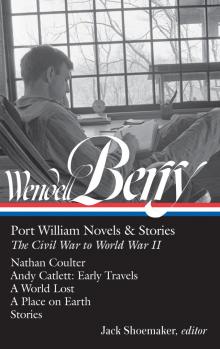 The Selected Poems of Wendell Berry
The Selected Poems of Wendell Berry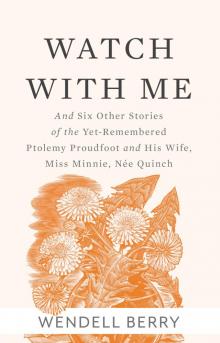 Watch With Me
Watch With Me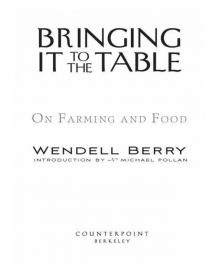 Bringing It to the Table: On Farming and Food
Bringing It to the Table: On Farming and Food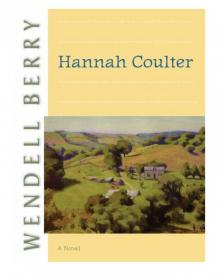 Hannah Coulter
Hannah Coulter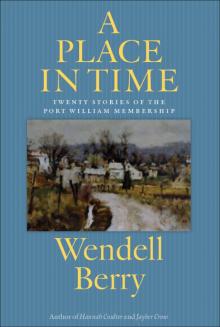 A Place in Time: Twenty Stories of the Port William Membership
A Place in Time: Twenty Stories of the Port William Membership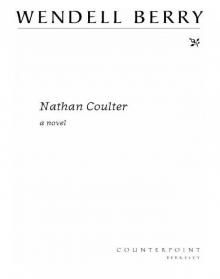 Nathan Coulter
Nathan Coulter Why I Am Not Going to Buy a Computer
Why I Am Not Going to Buy a Computer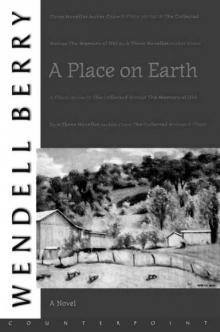 A Place on Earth
A Place on Earth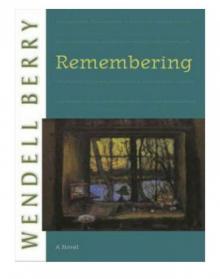 Remembering
Remembering New Collected Poems
New Collected Poems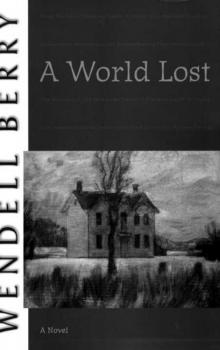 A World Lost
A World Lost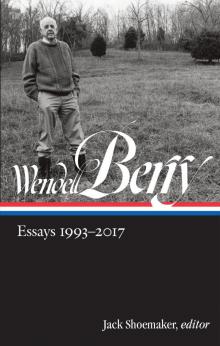 Wendell Berry
Wendell Berry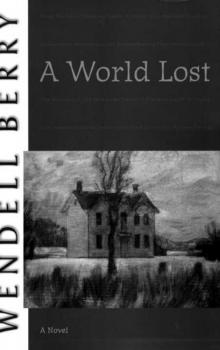 A World Lost: A Novel (Port William)
A World Lost: A Novel (Port William)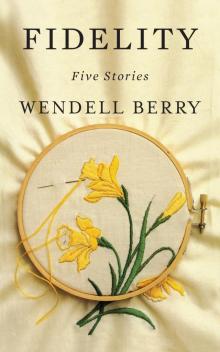 Fidelity
Fidelity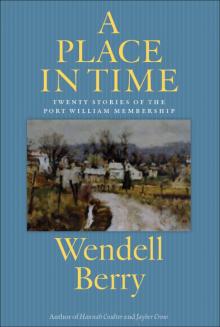 A Place in Time
A Place in Time